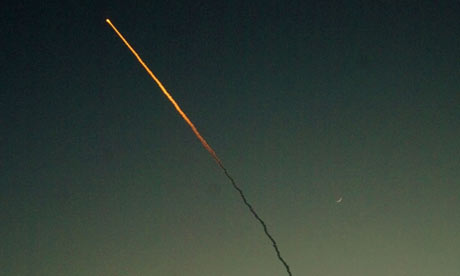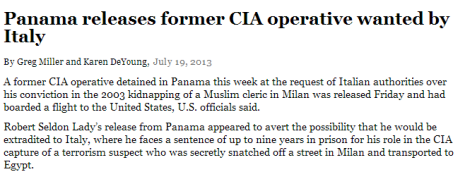Is Snowden a spy? Let's say he is. And let's say he's a spy for Global Main Street. As a spy for Global Main Street, shouldn't his job include finding out who the counter spies are? Isn't it his job to protect Global Main Street from those who could harm it, intentionally or unintentionally?
Now that Snowden has climbed the Beanstalk and exposed a network of counter spies, Global Main Street appears to be heading toward the familiar and historical impasse, where so many opportune moments for real change have died or become ineffective. Impasses usually disappoint because they force a compromise of ethics for the sake of unity. As of now, Global Main Street stands united in standing still together, looking up beanstalks and waiting. It's kind of like Waiting for Godot in the electronic age.
Where is Jack (Edward Snowden) in our Beanstalk Saga, anyway? Still in the clouds? On the Beanstalk? On his way to the political ovens? According to his lawyer, Snowden is still in Russia, where identity shaping and stripping are probably as ongoing as they are in the United States. Just a different version with greater intensity and transparency. For example, you can go to jail for creating art that satirizes Russian leaders. You are assured lives in Russia are being tracked on a barometer of obedience/dissidence. In America, the NSA is working toward such greater transparency as part of its job to keep the American people informed. It still amazes me how easy it seems for people in leadership roles to disregard the liberty and privacy of other people. People's lives are so precious, yet are treated so carelessly. Who can walk outside these days without breaking into tears?
The odds favor Snowden is sometimes in the clouds and sometimes stuck in different places on the beanstalk. In his arms he still carries the Golden Goose for Global Main Street. What will become of it? Maybe he needs help. He's probably tired. Maybe we all need to find a beanstalk.
Time Passes
It took the Syrian mass murder debacle to slink the NSA revelations back into the alleys, where the NSA debacle festers and its function increases in strength. You can tell I do not like this peeping vehicle. I suppose if I had one thing to become an activist over, it would be to help close down the NSA and other agencies like it around the world. Now both the Syrian mass murder debacle and NSA peeping debacle have stepped aside for the latest debacle, the US government shutdown. Time passes. Th US government shutdown takes the stage. Even in this it's Main Street that feels the kicks and bruises. I'm not much of a TV watcher, but it does feel like someone is switching channels. I can only imagine what's next.
I feel quite certain that the shutdown helps the NSA's Audacity of Peeking Program (AOPP) by diverting attention away from the spying programs, which continue to grow in size and power while Global Main Street continues to get more kicks and bruises.
Current Status of the NSA Surveillance Programs:
- Its workers and supporters get paid to dilute and narrow its scope to a hunt for terrorists
- It has crystalized its focus to Grand Protector in Operation Hush-Hush as in a children's sci-fi cartoon
- It has rigidly taken charge of limiting its own weakness to a few bad apples sneaking peeks through naturally arising prisms
What some are saying about the Surveillance.
Oct. 3: Glenn Greenwald maintains his position in an interview in which a newscaster worries over Greewald and Snowden carrying secrets belonging to governments that could end up in the hands of terrorists.
If a burglar breaks into homes in my neighborhood and I'm Head of Neighborhood Watch, do I have the right to set up a secret surveillance system in which I track all activities in my neighborhood such as tapping people's Internet accounts in order to catch the thief? If I get caught by my neighbors and I explain only parts of my secret system, insisting to dismantle it or explain any further might give the thief the facts to change his approach, does that transparency give credibility to the secret system I've created? It's not a clean analogy, but it hints at the irresponsible, intrusive and irrational world of these surveillance programs. As Head of Neighborhood Watch do I have the responsibility to be intelligent and ethical in my reasoning and choices? Or may I do what is easiest for me? Is it my choice to define intelligent and ethical to suit my needs?
The conversation with Glenn Greenwald ends about 14:10. Then a couple of people come on, an intelligence specialist refutes what Greenwald says. She explains why she thinks the surveillance programs are commonplace and should be accepted along with the latest electronic technology. A second person defends Greenwald, who almost gets the last word.
More News on the Topic
Alan Rusbridges, editor of The Guardian, in an hour-long interview (includes written transcript) on Democracy Now! on Sept. 23 discusses the background and present status of the Snowden revelations. It's an interview built on reminders about what has transpired over the past 3 months or so rather than on revelations or a deeper analysis of events or conditions.
About 34:00 On the Miranda detainment
About 40:00 On sharing documents with New York Times and ProPublica
About 46:00 On effects of surveillance on international business community and governments
About 50:00 Obama's reaction--just trust us
About 54:00 Letter to families of NSA employees sent by NSA Chief Director, Keith Alexander
About 56:00 On Julian Assange
"On Sept. 24, Ecuadorean Foreign Minister Ricardo Patiño discusses why President Rafael Correa is not attending this week’s United Nations General Assembly; the plight of WikiLeaks founder Julian Assange, who has spent more than 450 days in the Ecuador’s London Embassy after being granted asylum last year; and Ecuador’s role this past summer in the drama surrounding National Security Agency leaker Edward Snowden and his attempt to secure political asylum."

